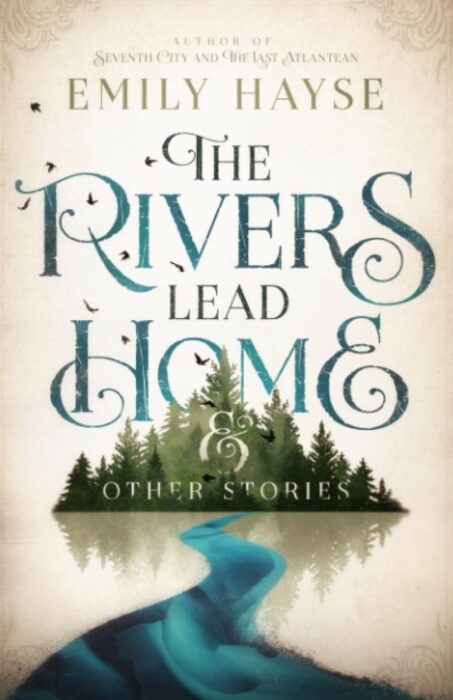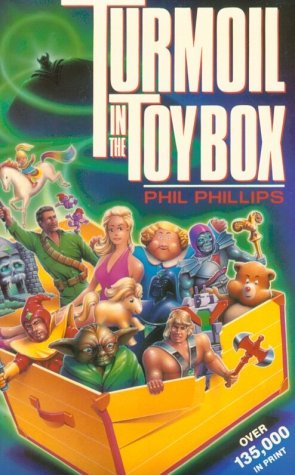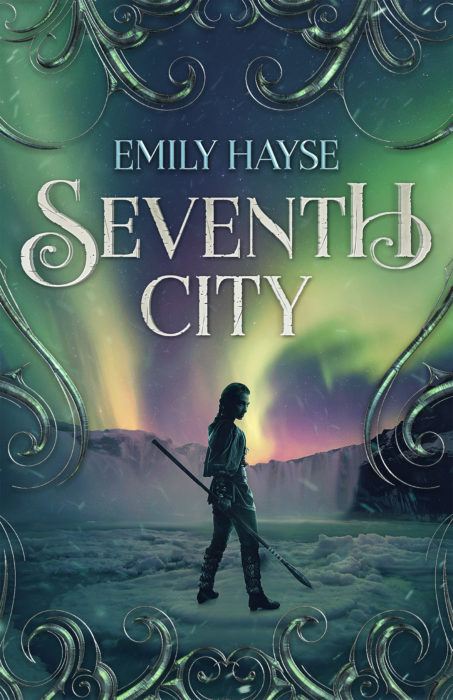42. What if Invaders Kidnapped Your Brother in a Frozen Land? | Seventh City, with Emily Hayse
Podcast: Play in new window | Download (Duration: 46:53 — 44.3MB) | Embed
What if you lived in an Arctic-like frontier, trying to survive despite the Invaders who keep moving into your native land? Then the Invaders kidnapped your brother, who told the captain the secret location of a lost treasure? Explore the award-winning fantasy novel Seventh City with us and author Emily Hayse!
From Lorehaven’s featured review of Seventh City:
Cold weather can bring wintry mixes of ice and freezing rain, which in turn can give us mixed feelings. Songs may romanticize falling snow and crackling fires, while kids long for days home from school. Then reality stings our skin with frostbite and makes grown-ups fear icy injuries and frozen pipes. Is winter, then, good or bad? It’s both and neither. Winter is just a season, offering equal parts peril and cheer.
So it is with Seventh City, the wintry-mixed and morally challenging fantasy from Emily Hayse. Set in a land north of this fantasy world’s Arctic circle, this tale starts simply: a young mother tells her daughter, Maki, about the fabled city, Inik Katsuk.
This is “the place where the heroes dwell,” the mother recalls. “It was closed to all but those who proved themselves worthy. . . . And the good live there.”
A day later, Maki and her older brother, Tsanu, can’t find her. Their mother has abandoned them. From there, Seventh City fulfills its silent pledge to explore a land of incredible physical and moral terrain. Chilled weather threatens your life, yet also blesses you with epic snowscapes, campfire camaraderie, and glimpses of the aurora borealis. Meanwhile, even heroes must tread on ground frozen by bitter grief: When Tsanu is kidnapped by a foreign military captain determined to find the lost city, Maki must rescue him by infiltrating the camp of these hated Invaders.
It’s in this territory, often unmapped by Christian readers, that Seventh City truly inspires. Yes, these Invaders are only irredeemable. Or are they? Yes, Maki’s people, the land’s natives, are only oppressed victims. Or are they? Readers tempted to favor simplistic approaches to the obvious bad guys—even invaders!—may grow by imagining themselves in a land that leaves one no easy choices to survive or do the most good. As one Invader (boldly named Ransom) phrases it, “There are many ways to react to the wrong we see in the world, Maki. Some run away from it, have nothing to do with it. Others ignore it—I cannot speak for them. It is the coward’s way. And still others brave it to its face and try, in their way, to make it better.”
Like a skilled dogsled driver, Hayse navigates such perilous turns and keeps all jostling characters and subplots on their course. It’s a beauty to behold, especially when realization dawns about these deeper cultural and moral themes.
Lest one expect any literary slush, it’s all been pre-cleared for smooth sledding. Sure, we’ve read those brave-girl-dresses-up-as-boy stories and seen other lost-city stories, but City treats these as relatively minor elements. Even one great leap, the concept that an ambitious and abusive Invader captain would trust one strange young man’s word about an ancient city, makes more sense by the story’s end.
Hayse portrays this land so realistically, even with detailed handling of horse-care and snowshoe-crafting, that one half-expects to hear mentions of the Klondike Gold Rush. Seventh City feels like a lost history from our own world. It is only separated from reality by imaginative touches like a mythical city and giant creatures.
Bundle up for Seventh City’s fantastical journey, and don’t mind the wintry skies. Only from such gray areas can we experience the lessons and wonders of winter.
Exploring Seventh City with author Emily Hayse
Emily Hayse is a lover of log cabins, strong coffee, NASCAR, and the smell of old books. Her writing is fueled by good characters and a lifelong passion for storytelling. When she is not busy turning words into worlds, she can often be found baking, singing, or caring for one of the many dogs and horses in her life. She lives with her family in Michigan. Follow her on her website, Twitter, and Instagram.

Today, Emily releases The Rivers Lead Home & Other Stories, a short story anthology set in the world of Seventh City. Find this new volume’s digital release or pick up the paperback.
We ask questions such as:
- How did you first discover biblical faith and fantastic imagination?
- Which images led to your creation of Seventh City?
- How did you read and research to bring Maki’s chilly world to life?
- You’ve mentioned this: how did your season of grief affect the story?
- You also mentioned this during the award announcements. Quite a surprise?
- What other (standalone? fantasy?) novels have you written?
- Which stories next seem to be calling your name?
Fantastic fans
David Corder writes about episode 35:
I enjoyed this episode about C.S. Lewis and his thinking in regards to creating story, and how it was talked about how you don’t “preach” in a story. Doing so doesn’t make it a story anymore, as you two pointed out.
But I find myself a little confused. I agree that fiction is a medium for conveying Truth, but I also got the impression from this podcast that that is all it should be used for, especially in terms of Christian creatives, which makes me question some of the work I write. Some of my fiction is just purely for fun, with no intention to have any subtle points directed towards God, which I don’t think necessarily is a bad thing. Does a poem about a rose, with no mention of God or any direct indication of Truth, not glorify God?
We offer responses to this question.
 Next on Fantastical Truth
Next on Fantastical Truth
We shall break the week of Thanksgiving. Then on Tuesday, Nov. 1, we’re hosting a post–Black Friday special! Once upon a time in the 1990s, Stephen got hold of a book called Turmoil in the Toy Box. Its cover and premise are pure 1980s evangelicalism: some toys seem “harmless” but may actually be corrupted by the occult. How do we now see such warnings as this book shared, and compare healthy Christian cautions with modern toy-shopping?






























Share your thoughts about this podcast episode